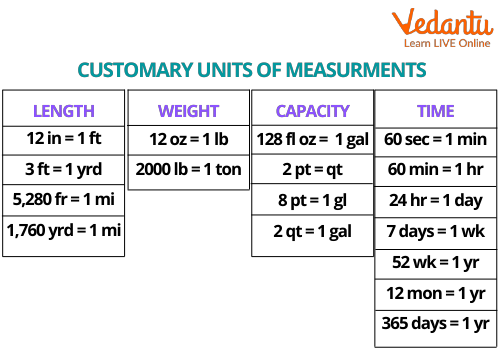




How to Convert Customary Units Easily for Everyday Math
Our life Without the Units of Measurement!
How do we express the measurement of time, weight, length and temperature? There is a specific unit of measurement for each. Imagine what would the scenario be if there was no definite system of measurement.
Inappropriate Answers Without Customary Units

Life without customary units
“What time of the day it is?”
- “The sun is over our head”
“How much is the weight of the trunk?”
- “The trunk is heavier than you”
“What is the temperature today?’
- “The temperature is hotter than yesterday”
You see, we cannot exactly or specifically express time, weight, length or temperature. This happens as there are no defined measurement units.
The Solution?
Thus, the English system of measurement introduced customary units, which are also known as the U.S Customary System.
History of Customary Units - Learn More About Customary Units of Length, Weight, Capacity and Temperature

Chart of customary units of measurement
In the year 1832, the U.S started its customary units after developing the idea from the English Units. The usage of the customary units made the life of the people very easy, especially in trades.
When the world witnessed its advantages, other nations slowly started to adopt these customary units. We are going to learn about these customary units. Customary units on length, weight, capacity, and temperature will be discussed by us. Keep reading to gain more knowledge about the customary units.
Study the Customary Units of Length
The customary units which are used for the measurement of length and distances in the customary system are as follows:
Inches
Feet
Yards
You can convert the different units of length into other units as well. The table below shows the conversion:
We will represent an example to show the same:
Converting 9 foot to inches.
We know 1 foot = 12 inches. Thus, 9 foot = 12 ×9 = 108 inches
Study About the Customary Units of Weight
The U.S. designed its customary units for measuring weights, which include ounces, pounds, and tons. Given below is the conversion of pounds to ounces and tons to pounds. Let us check!
Let us take an example to make our understanding clear.
Example: Calculate the ounces in 1 ton.
There is - 1 ton = 2000 pounds
1 pound = 16 ounces
So, 2000 pounds = 2000 × 16 = 32000 ounces. This means 1 ton = 32000 ounces.
Study About the Customary Units of Capacity (Volume)
The U.S. customary capacity or the volume measurement units are ounces, cups, pints, quarts and gallons. We can convert the customary units into customary equivalents as well and then into standard metric equivalents. Let us check how.
Let us take an example:
Converting 6 quarts to cups.
We know 1 quart = 2 pints
So, 6 quarts = 12 pints
then, 1 pint = 2 cups
So, 12 pints = 12 × 2 = 24 cups
Study About the Customary Units of Temperature
The customary measurement unit of temperature is °Fahrenheit. It should be known that 1 °C = 33.8 °F.
As we come to the end of the discussion of customary units, the students are advised to revise and understand the different types of units which are present and which are to be utilised in which specific units. Further, parents must make the study for their kids interesting; they can look up real life examples and show which units have which type of customary units.
FAQs on What Are Customary Units? Definitions, Uses & Examples
1. What are the main customary units for measuring length, weight, and capacity?
The customary system uses specific units for different types of measurement. Understanding these is the first step in learning measurement concepts as per the 2025-26 syllabus.
- For Length: We use inches (in), feet (ft), yards (yd), and miles (mi).
- For Weight: We use ounces (oz), pounds (lb), and tons.
- For Capacity (or Volume): We use fluid ounces (fl oz), cups (c), pints (pt), quarts (qt), and gallons (gal).
2. What is the customary unit for measuring temperature?
The customary unit for measuring temperature is Degrees Fahrenheit, written as °F. For example, a pleasant sunny day might be 75°F. This is different from the metric unit, Degrees Celsius (°C), which is commonly used in science.
3. Can you give some real-life examples of where we might see customary units used?
Yes, customary units appear in many everyday situations. For example:
- A piece of paper's length is often measured in inches.
- A person's height is commonly measured in feet and inches.
- A bag of flour or sugar from the store is often weighed in pounds.
- A carton of milk or a bottle of juice is frequently sold in gallons or quarts.
4. How are customary units different from metric units like centimetres and kilograms?
The main difference lies in their base system. The metric system (using metres, grams, litres) is based on powers of 10, which makes conversions simple (e.g., 100 centimetres in a metre). The customary system uses conversion factors that are not based on 10 (e.g., 12 inches in a foot, 16 ounces in a pound). While the metric system is the standard for science and most countries, understanding customary units is important as they are still used widely, especially in the United States.
5. Why is it important to use the correct unit for measurement? For example, why measure a road in miles and not inches?
Choosing the right unit makes numbers manageable and easy to understand. Measuring a long road in inches would result in a very large, impractical number. Using a larger unit like miles gives a smaller, more meaningful number. This concept is called scale. We use smaller units (like inches) for small objects and larger units (like miles) for great distances to keep measurements practical.
6. How do you convert a larger customary unit into a smaller one, for example, feet into inches?
To convert a larger unit to a smaller one, you need to know the conversion factor and then multiply. For example, we know that 1 foot = 12 inches. So, to find out how many inches are in 3 feet, you multiply the number of feet by 12:
3 feet × 12 inches/foot = 36 inches.
This method of using a known relationship to multiply applies to other conversions as well, such as pounds to ounces or gallons to quarts.
7. What is the difference between measuring weight and capacity?
Although both are types of measurement, they measure different properties of an object. Weight measures how heavy something is, which is the pull of gravity on it. We use units like pounds (lb) or ounces (oz) for weight. Capacity measures the amount of space a substance (usually a liquid) occupies inside a container. We use units like gallons (gal) or fluid ounces (fl oz) for capacity. So, a brick has weight, but a bottle has capacity.























